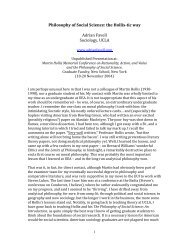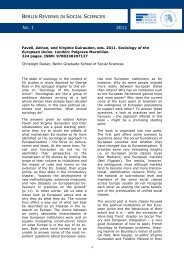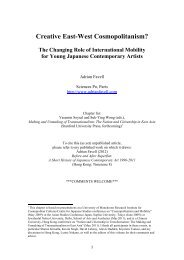Governmentality, political field or public sphere ... - Adrian Favell
Governmentality, political field or public sphere ... - Adrian Favell
Governmentality, political field or public sphere ... - Adrian Favell
Create successful ePaper yourself
Turn your PDF publications into a flip-book with our unique Google optimized e-Paper software.
496 European Journal of Social The<strong>or</strong>y 14(4)prohibitions of discrimination on the basis of nationality. At the same time, technologiesof differentiation are used to produce difference as grounds f<strong>or</strong> qualifying and limiting –but also marginalizing <strong>or</strong> excluding – certain individuals <strong>or</strong> groups from the Europeanpolity (e.g. ‘third country nationals’). Technologies of transparison are used to increasethe transparency of the policy process (e.g. the European Commission’s White Paper onGovernance) <strong>or</strong> they are established in the f<strong>or</strong>m of drafting charter, bills and declarationsof European rights that ‘can be posted, advertised, circulated in a way that invites thesubject to see her/himself as a user of rights’ (Walters and Haahr, 2005: 74). To explainwhy some of the mentioned technologies have failed so far, Walters and Haahr claim thatthese technologies also inhabit a symbolic <strong>field</strong>. The purposes of technologies, f<strong>or</strong> example,to ‘bring the EU closer to the people’ might be only secondary; the primary purposeis in fact the symbolic production of European democracy.Apart from the technologies of power that w<strong>or</strong>k in the <strong>field</strong> of ‘un/democraticEurope’, Walters and Haahr analyse the particular discourses of democracy that describeand define the <strong>field</strong>, such as the discourse of popular sovereignty, of justice, and ofrationality. They conclude that the variety of discourses and technologies of democraticlegitimacy show the polym<strong>or</strong>phousness of European democratic space, as ‘it is continuallyunsettled by counter-discourses and social f<strong>or</strong>ces which it cannot successfullyassimilate <strong>or</strong> neutralize. Some signs are m<strong>or</strong>e salient than others, some voices are loud,others are murmurs’ (Walters and Haahr, 2005: 86).While providing an inspiring new reading of the debate about the democratic deficitas well as of institutional attempts to overcome some of the perceived <strong>or</strong> constructeddemocratic deficiencies of the EU, Walters and Haahr themselves point to a certainweakness of their approach. They admit there might be a certain naivety here, of takingpractices at their w<strong>or</strong>d: ‘The point is, how many people really believe that initiatives likeinternet f<strong>or</strong>ums, <strong>or</strong> even improved procedures <strong>or</strong> consultation in policy-making are goingto significantly enhance European democracy?’ (2005: 79). Unf<strong>or</strong>tunately, they do notspecify this point any further, as well as not expl<strong>or</strong>ing m<strong>or</strong>e their observations on whysome discourses are able to dominate while others are not. This points to a generalsh<strong>or</strong>tcoming in the governmentality approach: they tend to describe <strong>political</strong> processeswithout identifying and expl<strong>or</strong>ing act<strong>or</strong>s <strong>or</strong> agency. Indeed, governmentality the<strong>or</strong>istsoften limit their focus to top-down programmatic politics represented by official policiesand strategies. Even though they disclose how the mentalities and technologies of powerare supposed to w<strong>or</strong>k, we hardly learn anything about how they are implemented in termsof the conduct of individuals, groups, populations <strong>or</strong> the state. C<strong>or</strong>respondingly, it isoften ign<strong>or</strong>ed how governmental practices are resisted.Most governmentality accounts of the EU thus remain – despite their <strong>or</strong>iginal view ofthe state – unnecessarily state-centric. They tend to look only at the governmentalizationof Europe from above. Although from a governmentality perspective government isunderstood as including all activities that aim at directing the conduct of individuals,empirically their studies are usually only concerned with mentalities and technologiesof government developed at the level of f<strong>or</strong>mal <strong>political</strong> EU institutions. This leavesan open question as to how such rationalities might w<strong>or</strong>k through other f<strong>or</strong>ms of politics.F<strong>or</strong> a m<strong>or</strong>e comprehensive sociological understanding of the EU we also need to knowhow this governmentalization of the EU takes places from below <strong>or</strong> through new social





